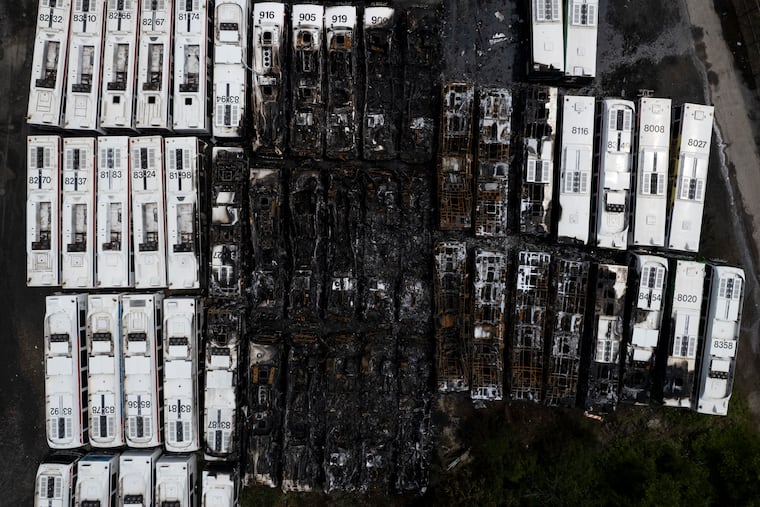Massive fire at SEPTA bus lot was caused by electric batteries that have ignited before
It's not the first time Proterra-made buses have caused havoc for SEPTA.

A fire that enveloped 40 decommissioned SEPTA buses Thursday is believed to have started with a bus battery in a Proterra electric bus, according to SEPTA.
A fire department spokesperson confirmed that the Fire Marshal’s Office determined a battery to be the cause of the blaze, but referred additional questions to the transit agency.
The electrical fire started with a lithium-ion battery, which is only found on the Proterra buses in the lot, said SEPTA spokesperson Andrew Busch.
On Thursday, SEPTA General Manager Scott Sauer had already said he wanted to find a way to get the buses off-site.
“We have to get them off of our property and away from the potential where we could have an incident like this that could have been far worse,” he said.
Busch confirmed Friday that Sauer directed staff to “expedite buses off the property.”
That’s because it’s not the first time that Proterra-made electric bus batteries have caused havoc for SEPTA.
A battery power pack in a sidelined electric bus ignited inside SEPTA’s Southern Bus Depot in November 2022, occupying Philadelphia fire crews for hours and halting the transit agency’s efforts to build a green fleet.
SEPTA bought 25 battery-electric buses from California-based Proterra in 2016, but all have been parked since 2020 after discovery of cracks in the vehicles’ chassis, lackluster performance, and battery life that is too short for city bus routes. Sixteen were damaged in Thursday’s fire.
Proterra filed for Chapter 11 bankruptcy protection in August 2023 as it was facing lawsuits from some transit agencies over problems with zero-emission buses they had ordered from the company.
SEPTA had been keeping the battery-electric buses as potential evidence in its litigation against Proterra. Officials were negotiating to get money back from the company when it entered bankruptcy; SEPTA then filed a claim with the bankruptcy court that is pending.
The agency spent about $24 million for the buses.
The company’s transit bus division was purchased by Phoenix Motorcars in bankruptcy proceedings. In September, the National Highway Traffic Safety Administration recalled two Proterra bus models after Phoenix informed officials that issues with software that controlled cooling fans made the batteries prone to overheat and ignite.
Industry pioneer Proterra began in 2004 and sold its first electric-battery bus in 2009, by which point it was well on its way to becoming a political and business darling as transit agencies across the country were looking to shift away from diesel to meet climate goals.
Former President Joe Biden’s administration pushed the adoption of buses that produced fewer greenhouse gas emissions. The 2021 bipartisan infrastructure law provided $5.5 billion for low- and zero-emission buses over five years, with billions more available through other federal grant programs and battery production tax credits from the administration’s Inflation Reduction Act environmental legislation.
Thursday’s fire broke out at around 6:15 a.m., the start of rush hour in SEPTA’s largest bus depot, which has some 600 employees on-site at any given time. The fire affected a lot in the rear of the facility, which housed about 100 buses that were slated for the scrapyard.
Though no one was injured and there was no major impact to the morning commute, the three-alarm blaze had SEPTA employees and emergency workers scrambling as they worked to quickly tow decommissioned buses out of the tightly packed grid where the fire was spreading. First responders said they also had to take down fences to bring hoses within reach of the fire.
The Department of Public Health urged nearby residents to stay inside their homes and area schools turned off their HVAC systems as thick black smoke hovered over the Roosevelt Expressway. Health Commissioner Palak Raval-Nelson said elevated levels of benzene, ethyl benzene, and carbon monoxide were detected as the fire burned, keeping mobile air quality testing on-site throughout the day. The department lifted its recommendation to stay indoors by Friday morning after pollutants in the air dropped to normal levels.